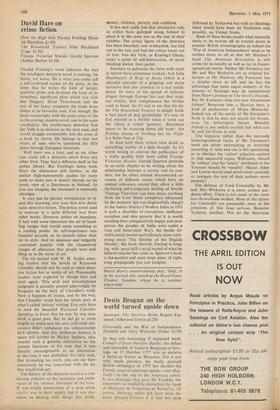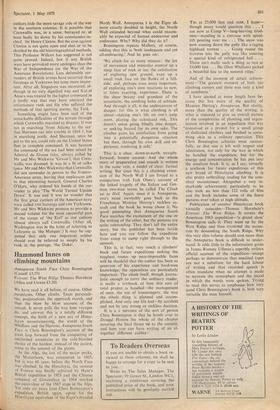Denis Brogan on the world turned upside down
In that still interesting if neglected book, Creasy's Fifteen Decisive Battles, the defeat and surrender of General Burgoyne at Sara- toga on 17 October 1777 was as decisive a battle as Valmy or Waterloo. For it not only made pointless the badly planned British campaigns of 1777 but decided the French court to intervene openly—and effec- tively—on the side of the American rebels.. It was Saratoga that gave Dr Franklin the arguments he needed to strengthen the hand of Monsieur de Vergennes at Versailles. Of course, Saratoga might not have been de- cisive (despite Creasy) if it had not been
followed by Yorktown but with no Saratoga there would have been no Yorktown and, possibly, no United States.
Each of these books recalls what naturally tends to be written off or written down in popular British historiography as indeed the `War of American Independence' tends to be written down or off so that Mr Mackesy's
loyal The American Revolution is wel- come for its novelty as well as for its histori- ographical merits. Neither Mr Furneaux nor Mr and Mrs Wickwire are as original his- torians as Mr Mackesy. Mr Furneaux has a simpler story to tell and he has the advantage that some vague memory of the disaster of Saratoga may be remembered from Shaw's preface to The Devil's Disciple. But Mr Furneaux does not turn 'Gentleman Johnny' Burgoyne into a Shavian hero, a kind of predecessor of Major Bluntschli. Indeed one of the merits of Mr Furneaux's book is that he does not search for heroes, even for unfortunate heroes. Benedict Arnold is not unduly exalted and what can be said for Gates is said.
The linguistic rather than the narrowly historiographical faults of Mr Furneaux's book are either entertaining or irritating according to taste and one is left speculating as to whether the 'callow' adjective applied to that successful rogue, Wilkinson, should be 'callous' and the 'venery' attributed to the Treasury should be 'venality'. Messrs Allen and Unwin should read proof more carefully or castigate the text of their authors more severely!
The defence of Lord Cornwallis by Mr and Mrs Wickwire is a more serious aca- demic effort. There is not much of the mere lues Boswelliatta evident. Most of the claims for Cornwallis are reasonable, most of the criticisms of that beau sabreur, Banastre Tarleton, justified. Nor do the American authors hide the more savage side of the war in the southern colonies. It is possible that Cornwallis was, in a sense, betrayed or, at least badly let down by his commander-in- chief, Sir Henry Clinton. But the case against Clinton is not quite open and shut or to be decided by the old historiographical methods. This Professor Willcox has suggested is not quite proved. indeed, few if any British wars have provoked more apologias than the War of Independence (or the War of the American Revolution). Less defensible sur- renders of British armies have occurred than Saratoga or Yorktown but none more impor- tant. After all, Singapore was recovered, al- though in no very dignified way and Kut-el Amara was treated by the higher command in a lordly way that may have annoyed the unfortunate rank and file who suffered the methods of that sporting enemy, the Turk.
Something might have been said of the remarkable difficulties of the terrain through which Cornwallis marched to disaster. It was not in marching 'from Atlanta to the sea' that Sherman ran into trouble in 1864-5, but in marching north. And Sherman, once he got to the sea, could rely on the United States fleet in complete command. It was because the command of the sea had been seized by Admiral de Grasse (alas, always called by Mr and Mrs Wickwire 'Grasse), that Corn- wallis was doomed. It was in a fit of sulks (pace Mr and Mrs Wickwire) that Cornwallis did not surrender in person to the Franco- American army, leaving that unpleasant job to that interesting bastard, General Charles O'Hara, who ordered his bands at the sur- render to play The World Turned Upside Down'. It was and it was no wonder that the first great carriers of the American navy were called uss Saratoga and uss Yorktown. Mr and Mrs Wickwire promise to provide a second volume for the most successful part of the career of 'the Earl' as our authors almost always call Cornwallis. (After all, Washington was in• the habit of referring to Lafayette as 'the Marquis'.) It may be sug- gested that only one important soldier should ever be referred to simply by his rank in the peerage, 'the Duke'.



































 Previous page
Previous page